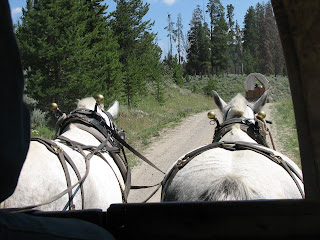

Nights were spent in a tent. Karina and I had taken sleeping bags and two small pillows. The sleeping bags occupied the entire floor of the tent, but we were lucky enough to have an extra tent set up for us that we used as a closet. That's where we put our duffle bag and two other bags. Wagons West provided pallets so we had some cushioning.
The altitude made for heat during the day, but at night it got below freezing. We would get up in the morning to find frost on the ground and on the tables and benches where we ate. In the afternoon after resting up from supper, Paul would play the guitar and sing or recite his own cowboy poetry, Col. Sanders would do tricks with a whip, but a lot of us wanted to go to bed early--well, okay, Karina, me and Mary. The night sky was unbelievable: we saw shooting stars, the Milky Way (which I hadn't seen since I lived in Michigan), and a moon so bright you didn't really need your flashlight as long as it was above the horizon.
After supper the horses were let loose. They had cowbells around their necks so that in case one or more failed to return, the cowboys would be able to locate them. It made for a surreal and beautiful experience: the horses would mill around close to camp for quite a while, cowbells tinkling, and then as it got later they would all go off far enough so that we couldn't hear them. Then, very early in the morning before sunrise, they would return. All of us waited for that moment. The sound of the bells was crystal clear in the icy air, and the horses would walk right through where our tents were set up, so we heard not just the bells but the thud of their hooves as they went past the tents. We all fell in love with the sound of the horses returning.
One night we heard the yipping of coyotes, and then shortly after that, the howling of wolves. The wolves had been very close, barely a hill away from us. They are not the Rocky Mountain wolves that are native to the region, but huge Canadian gray wolves weighing in at some 200 pounds, brought in by some government idiot who decided to even up the prey-predator situation. The result is that the Canadian wolves have almost eliminated the moose population and are making terrible inroads in the elk population too. They have killed off the native wolves or displaced them. The cowboys said they had lost only one horse to wolves in the time Wagons West has been operating (over thirty years), but the presence of wolves outside the unreachable mountain wilderness areas is disquieting. They may be getting hungrier and bolder.
The fires for cowboy coffee would be started around three-thirty in the morning. Karina and I decided the stuff is addictive. Mary and I were the first up, and we would hang out around the cooking fire and drink the brew while Mary warmed her feet near the flames and I managed to get two cups down. During the rest of the day, we were asked to always have our canteens with us in the wagons or on rides because insufficient hydration could lead to altitude sickness. As a result, Karina and I drank water until we were ready to pop, and our urine became so diluted that it was like water itself. This I know because on our first Dixie cup expedition into the woods, I managed to douse myself with most of the contents of my Dixie cup when I tripped trying to get my riding pants back up. By the time we left, I had the whole operation down to a science, but it was a considerable relief not to have to ride back to camp that afternoon smelling like pee!
On Wednesday night the talent show was held. Everyone had to participate, talented or not, and the cowboy crew did a great skit for us. Karina took the event by storm when she read her ideas for a new Wagons West brochure, that included the attractions of bathing in three ounces of water and experiencing terminal butt fatigue. It was so funny that Mary wanted it, and I wouldn't be a bit surprised if you find it included in the next Wagons West publicity info on Internet.
Next on the blog, the Trail Ride From Hell.







